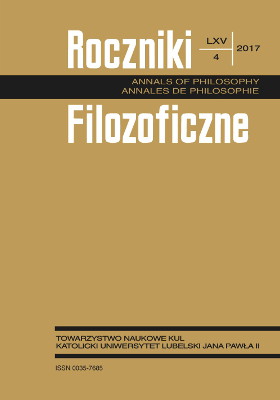Krytyka pewnej postaci współczesnego deizmu jako projektu nowej religii w zglobalizowanym świecie. Na marginesie książki Roberta Corfe’a Deism and Social Ethics
Criticism of a Certain Form of Contemporary Deism as a New Religion Project in a Globalized World: Considerations around the Robert Corfe’s Book Deism and Social Ethics
Author(s): Antoni SzwedSubject(s): Philosophy, Special Branches of Philosophy, Philosophy of Religion
Published by: Towarzystwo Naukowe KUL & Katolicki Uniwersytet Lubelski Jana Pawła II
Keywords: deism; social ethics; natural religion; globalism; absolute
Summary/Abstract: In his essay entitled Deism and Social Ethics: The Role of Religion in the Third Millennium, Robert Corfe presents a contemporary version of deism. His concept is not a simple continuation of eighteenth-century English deism, but is a considerably modified theory, taking into account modern achievements of the natural sciences. The author believes that the main threat to world peace comes from conflicts between followers of the largest monotheistic religions like Islam and Christianity. A main task of contemporary deism would be the construction of agreement among the large religious communities in the world by means of continuous rational persuasion. Above all, the proposed deism would be a global ethics, related to an impersonal cosmic Deity (the Good). Simultaneously, it would break with all supernatural religions (theologies) based on different revelations. These latter are the source of irrationalism according to Corfe. It would be much better to replace them with a suprahuman rationalism discovered in Nature and deriving from Divine Reason immanently existing in the Universe. Corfe’s deism would be an alternative to atheism, popularized among educated men in Western countries. Also his deism is addressed to all people, who are making now political and economic decisions in a globalized world. As such, his deism can be a great worldwide ideology, especially useful for those who have an influence on the fate of the contemporary world. In this article are presented the main features of the above-mentioned version of deism, as well as a critical assessment of this type of deism, including a discussion of hidden and controversial presuppositions. It is found that this version of deism is not as persuasive and rational as its author thinks.
Journal: Roczniki Filozoficzne
- Issue Year: 65/2017
- Issue No: 4
- Page Range: 271-292
- Page Count: 22
- Language: Polish

